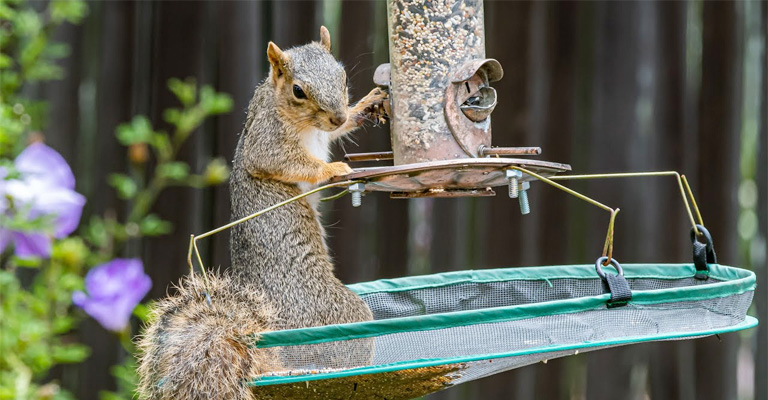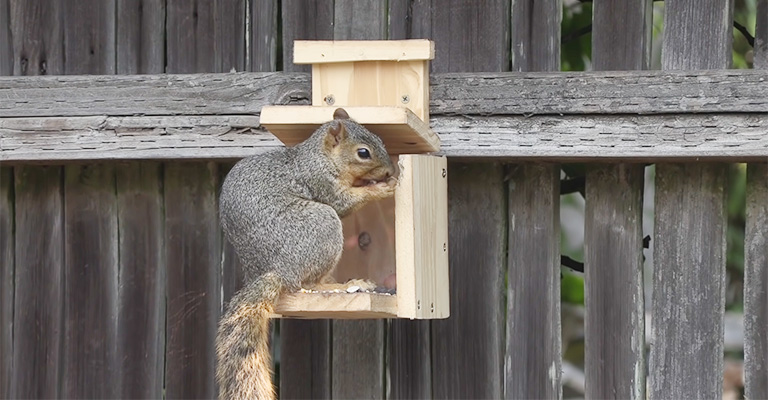Birdwatching can be a peaceful and rewarding hobby, but it’s not without its challenges, especially when pesky squirrels decide to raid your bird feeder.
These crafty critters can quickly empty your feeder and deter feathered friends from visiting. However, fear not! With the right tactics, you can enjoy a squirrel-free bird haven in your backyard.
In this guide, we’ll explore how to keep squirrels off the bird feeder to ensure that your bird feeder remains a haven for your avian visitors. From clever feeder placement to squirrel-proofing techniques, we’ve got you covered.
Say goodbye to those acrobatic squirrels and hello to a thriving bird sanctuary right outside your window. Let’s dive into the world of squirrel deterrents and create an environment where your feathered friends can feast in peace.

How to Keep Squirrels Off Bird Feeder?
Keeping squirrels off bird feeders can be a challenging but necessary task to ensure that your feathered friends get their fair share of food.
Here, we’ll explore various methods and strategies to help you squirrel-proof your bird feeder and create a more enjoyable birdwatching experience.
Choose the Right Bird Feeder
Selecting the appropriate bird feeder can be your first line of defense against squirrels. Opt for feeders designed specifically to deter squirrels. Some effective options include tube feeders with metal cages or weight-sensitive perches.
These feeders are designed to close or block access when a squirrel’s weight is applied, making it difficult for them to access the food.
Location Matters
Where you place your bird feeder can greatly impact its vulnerability to squirrels. Hang your feeder at least 5-6 feet above the ground and 10-15 feet away from trees, fences, or other structures that squirrels can use as launching pads.
Ensure there’s no nearby tree branch or structure that allows squirrels to jump onto the feeder.
Install a Baffle
A squirrel baffle is a cone or dome-shaped device that you can place above or below your bird feeder. When installed properly, baffles prevent squirrels from climbing up or down to reach the feeder.
Mounting a baffle on the pole or suspending it from above can be an effective way to deter squirrels.
Use Squirrel-Proofing Accessories
There are various squirrel-proofing accessories available, such as squirrel-proof cages, guards, or wrap-around collars. These can be added to your existing bird feeder to make it more squirrel-resistant.
Make sure to follow the manufacturer’s instructions for proper installation.
Choose Squirrel-Resistant Seeds
Squirrels are attracted to certain types of bird seeds, such as sunflower seeds and peanuts. Opt for seeds that are less appealing to squirrels, like safflower seeds or nyjer (thistle) seeds. Many birds enjoy these seeds, while squirrels tend to avoid them.
Implement Repellents
Squirrel repellents can be an effective way to deter these pests. There are both commercial and DIY options available. Commercial repellents often come in spray or granule form and can be applied around the bird feeder area.
DIY options may include using spicy substances like cayenne pepper mixed with seed or creating a slippery surface using vegetable oil on the feeder pole.
Maintain Your Feeder
Regular maintenance of your bird feeder can help deter squirrels. Keep it clean and free from spilled seeds, which can attract squirrels. Consider a tray or seed catcher to reduce seed spillage.
Create a Squirrel-Friendly Feeding Area
To divert squirrels from your bird feeder, create a designated squirrel feeding area away from the bird feeders. Fill this area with food that squirrels enjoy, such as corn, nuts, or squirrel-specific feeders.
By providing an alternative food source, you can reduce their interest in the bird feeders.
Use Motion-Activated Devices
Motion-activated devices like sprinklers or lights can startle and discourage squirrels from approaching your bird feeder. These devices can be a humane way to keep squirrels at bay.
There are electronic devices available that emit high-pitched sounds or flashing lights when motion is detected.
These can startle squirrels and deter them from climbing the shepherd’s hook. Make sure to follow the manufacturer’s instructions for proper installation and usage.
Be Persistent and Patient
Squirrels are persistent creatures, and it may take some time to find the right combination of deterrents that work for your situation. Be patient and willing to adjust your strategies as needed.
To further discourage squirrels, ensure there are no other squirrel-attracting features nearby. This includes keeping birdseed spills cleaned up on the ground and removing any other potential food sources like fallen fruits or accessible garbage cans.
By employing a combination of these strategies, you can significantly reduce squirrel interference and enjoy birdwatching without the constant challenge of squirrels near your bird feeder.
Remember that persistence and creativity are key when it comes to outsmarting these clever critters.
What Smells Keep Squirrels Away from Bird Feeders?

Squirrels are notorious for their persistence when it comes to raiding bird feeders. To deter them, many people turn to the power of scents. While there’s no foolproof scent that guarantees squirrel repellency, there are several odors that squirrels tend to dislike.
In this comprehensive guide, we’ll explore various smells that can help keep squirrels away from your bird feeders and provide tips on how to use them effectively.
Cayenne Pepper
Cayenne pepper is a common household spice known for its heat. Squirrels have sensitive noses, and the spicy scent of cayenne pepper can be quite off-putting to them.
To use it as a squirrel deterrent, sprinkle cayenne pepper around the base of your bird feeder. Mix cayenne pepper with birdseed. Birds are not affected by the spice but squirrels will be discouraged from eating it.
Mothballs
Mothballs have a strong, pungent odor that most animals, including squirrels, find unpleasant. To use mothballs effectively, place mothballs in a mesh bag or sock and hang it near your bird feeder.
Be cautious with mothballs, as they contain toxic chemicals. Keep them away from children and pets.
Peppermint Oil
Peppermint oil has a refreshing scent that can deter squirrels. Here’s how to use it. Soak cotton balls in peppermint oil and place them strategically around your feeder.
Consider planting peppermint or spearmint near the feeder, as the scent from the plants can act as a natural deterrent.
Vinegar
Vinegar has a sharp, sour smell that squirrels dislike. To use vinegar, mix a solution of equal parts water and white vinegar and spray it on the ground around your feeder. Soak a cloth or sponge in the vinegar solution and place it near the feeder.
Predator Urine
Predator urine, such as that of foxes or coyotes, can signal danger to squirrels. You can purchase it at outdoor supply stores. To use predator urine, apply a few drops around the perimeter of your bird feeder. Reapply after rain to maintain effectiveness.
Safflower Seed
While not a smell, safflower seeds are a type of birdseed that many squirrels find unappealing. Cardinals and chickadees, on the other hand, enjoy safflower seeds. Simply fill your feeder with safflower seeds, and it may discourage squirrels from visiting.
Bar Soap and Eucalyptus
Strongly scented bar soaps, such as Irish Spring, can deter squirrels. Here’s how to use them. Shred or cut the soap into small pieces and scatter them around your bird feeder. Hang a few bars of soap near the feeder.
The scent of eucalyptus can be effective in keeping squirrels away. To use eucalyptus, plant eucalyptus trees or shrubs near the feeder. Hang eucalyptus branches or leaves around the feeder.
Blood Meal
Blood meal, a fertilizer made from dried animal blood, emits a strong odor that squirrels typically find unpleasant. To use blood meal, sprinkle it on the ground around your feeder. Reapply as needed, especially after rain.
Commercial Squirrel Repellents
There are various commercial squirrel repellents available, usually in the form of sprays or granules. These products contain a combination of scents and may be effective in deterring squirrels. Follow the manufacturer’s instructions for the best results.
Tips for Using Scents as Squirrel Deterrents
Squirrels can become accustomed to a particular smell over time. Change the scent regularly to maintain its effectiveness. Apply or refresh the chosen scent regularly, especially after rain or heavy moisture.
Using multiple squirrel deterrents simultaneously, such as cayenne pepper and predator urine, can be more effective. Keep an eye on squirrel activity around your feeder and adjust your methods as needed.
While scents can be helpful in deterring squirrels, it’s important to remember that squirrels are clever and adaptable creatures. They may eventually overcome their aversion to a particular smell.
Therefore, it’s wise to use a combination of scent-based deterrents along with physical barriers, like baffles or squirrel-proof feeders, to maximize your success in keeping squirrels away from your bird feeders.
FAQs
What attracts squirrels to bird feeders?
Squirrels are attracted to bird feeders because of the easy access to food. The seeds intended for birds are a tasty treat for them.
How can I physically prevent squirrels from reaching the bird feeder?
You can use squirrel baffles, cone-shaped barriers, or pole-mounted baffles to block squirrels’ access to the feeder.
Are there squirrel-resistant bird feeders available?
Yes, squirrel-resistant bird feeders have features like weighted perches or cages that prevent squirrels from reaching the seeds.
What types of birdseed are less appealing to squirrels?
Safflower seeds and Nyjer seeds are less attractive to squirrels, making them a good choice if you want to deter them.
Are there natural ways to keep squirrels away from bird feeders?
Using spicy additives like cayenne pepper in the birdseed or offering squirrel-friendly food in a separate location can help divert squirrels from the feeder.
Conclusion
By implementing these effective strategies, you can maintain a squirrel-free environment around your bird feeder and enhance your birdwatching experience.
Remember to regularly monitor your setup and make adjustments as needed to stay one step ahead of those persistent squirrels.
Creating a bird-friendly space in your backyard not only provides entertainment and relaxation but also contributes to the conservation of local bird species.
With patience and the right methods, you can enjoy the delightful sights and sounds of your feathered friends without the interference of squirrels.
So, go ahead and implement these tips to protect your bird feeder. Your efforts will be rewarded with a thriving bird oasis, where you can marvel at the beauty of nature’s winged wonders without any unwanted guests.